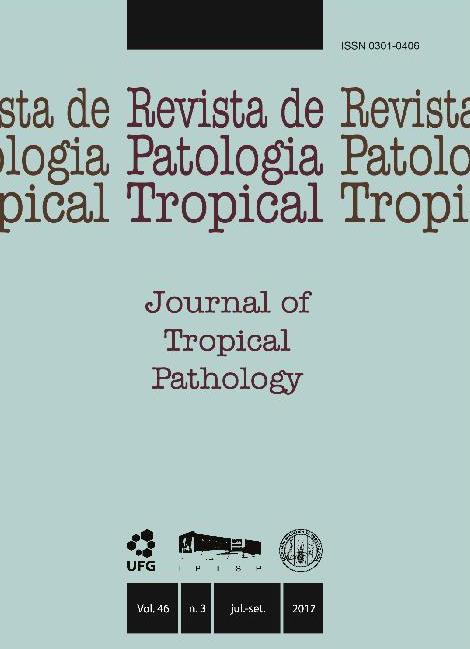PREVALENCE AND RISK FACTORS FOR INTESTINAL PARASITIC INFECTIONS IN CHILDREN ATTENDING DAYCARE CENTERS IN ALFENAS, SOUTHERN MINAS GERAIS, BRAZIL
DOI:
https://doi.org/10.5216/rpt.v46i3.49355Palavras-chave:
Intestinal parasites, prevalence, risk factors, daycare center.Resumo
Intestinal parasitic infections are common among pre-school children in developing countries and they are often associated with gastrointestinal morbidity such as chronic diarrhea and malnutrition. Their circulation is mainly associated with lack of personal hygiene and environmental sanitation, as well as limited housing and food conditions. As the diagnosis of intestinal parasites is not a simple procedure, especially in population studies, due to difficulties
encountered in strategies to obtain fecal samples, reliable prevalence data are scarce. Indeed, the epidemiological data on the prevalence of these parasites in different locations are important for the development of appropriate control measures. This study aimed to investigate the prevalence and risk factors associated with intestinal parasitic infection in children attending three public municipal daycare centers in Alfenas, MG. Three fecal samples from each child
were collected on alternate days and processed by the spontaneous sedimentation technique and also through the commercially available centrifugal concentration technique, known as the TF-Test® (TFT). Information on the biological, social and physical environment, in which the children lived, were obtained through the application of a socio-epidemiological questionnaire
to the parents or guardians and daycare staff. Giardia duodenalis was the parasite species most frequently detected among the children, with a positive rate of 27.8% (77/277). Entamoeba coli was detected in one of the daycare centers studied, with positivity rate of 43.7%, (7/16); and helminth infection in only two children. The present study showed that children of municipal
daycare centers in Alfenas could be at risk of infection by intestinal parasites.
Downloads
Downloads
Publicado
Como Citar
Edição
Seção
Licença
The manuscript submission must be accompanied by a letter signed by all authors stating their full name and email address, confirming that the manuscript or part of it has not been published or is under consideration for publication elsewhere, and agreeing to transfer copyright in all media and formats for Journal of Tropical Pathology.

